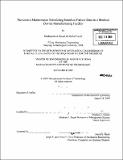Preventive maintenance scheduling based on failure data in a medical device manufacturing facility
Author(s)
Mohd Fauzi, Mohammed Faizal B
DownloadFull printable version (14.12Mb)
Other Contributors
Massachusetts Institute of Technology. Dept. of Mechanical Engineering.
Advisor
Stephen C. Graves.
Terms of use
Metadata
Show full item recordAbstract
This study was conducted at a medical device production facility where analysis was done on the reliability of Product S barrel molds for the purpose of predicting preventive maintenance (PM) schedule. Pareto Rule was utilized to filter out the defect-types that are causing 80% of the defect occurrences. Defect density was introduced, i.e. the ratio between total number of defects occurred per cavity position to the total types of defects occurring on that same position, as a performance measure to track defects over the mold cavities . Statistical distribution tests on the failure times of the molds were carried out and found that the failure times for the molds differ. Mold failure times follow the log normal or Weibull distribution. Parameter estimates obtained from probability plots of these distributions were used to obtain the mean-time-to-failure (MTTF) and reliability of the molds. Finally, this study looked into the scheduled preventive maintenance (PM) of the molds based on the current PM task list. Failure times based on individual mold PM task lists that correspond to the mitigation of the priority defect-types, were collected and assigned a statistical distribution. After which, we analyzed the expected number of annual mold failures based on the relevant parameters of the failure times distribution and the various PM scheduling policies proposed, to derive a recommendation on the optimal PM interval to be performed in a year.
Description
Thesis (M. Eng.)--Massachusetts Institute of Technology, Dept. of Mechanical Engineering, 2009. Cataloged from PDF version of thesis. Includes bibliographical references (p. 80-81).
Date issued
2009Department
Massachusetts Institute of Technology. Department of Mechanical EngineeringPublisher
Massachusetts Institute of Technology
Keywords
Mechanical Engineering.